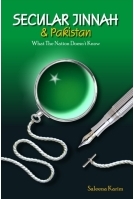 Since starting this blog, I’ve been posting a little bit about writing Systems, and only a tiny bit (one post thus far) about its core. I’ve been reluctant to write extensively on the core because I didn’t want the formal stuff to clutter this blog and give people the wrong idea about the story – which is a lot more entertaining, I assure you. Yet something hasn’t felt quite right.
Since starting this blog, I’ve been posting a little bit about writing Systems, and only a tiny bit (one post thus far) about its core. I’ve been reluctant to write extensively on the core because I didn’t want the formal stuff to clutter this blog and give people the wrong idea about the story – which is a lot more entertaining, I assure you. Yet something hasn’t felt quite right.
 Everyone who knows me as a writer identifies me with Secular Jinnah. My mailing list is made up almost entirely of folk who are interested in Pakistan’s founding history. To them, Systems has no connection to my other titles.
Everyone who knows me as a writer identifies me with Secular Jinnah. My mailing list is made up almost entirely of folk who are interested in Pakistan’s founding history. To them, Systems has no connection to my other titles.
BENEATH THE SURFACE
But there is a connection, even if it’s not immediately obvious to my readers (and wouldn’t be noticed at all by most non-Pakistani readers). And I know I haven’t exactly been helping either. In my original announcement email for Systems to my list in early December 2011, I said that ‘any resemblance to the Pakistan idea’ was ‘entirely coincidental’. Now that was a tongue-in-cheek joke coming from a conversation I was having with a friend at the time, but I think they took it seriously. Even later on, after I clarified that actually there is a connection, they didn’t buy it. Perhaps they thought I was just trying to sell the novel. I wasn’t.
Recently at another writer’s blog I told a fellow writer that my non-fiction and fiction were virtually unconnected. I was telling the truth, insofar as there’s not an obvious connection on a surface level. But it’s not true at the core. Not even remotely. Systems is social commentary in the broadest sense, and its core is very much inspired by the discoveries I made when I was writing about the Pakistan idea. In short, Systems simply wouldn’t exist without Secular Jinnah. Funnily enough, I even mentioned this on the description page for Systems on Amazon.com a few weeks ago but didn’t carry that point over to here. So it’s about time I did. Of course, I do love writing about storytelling and pencraft, and I will continue to do so. But I must follow my own advice and try to reveal the core of this novel.
BACK TO THE BEGINNING
So starting this Sunday I’m starting a mini-series about the story behind Systems. Doing so will help me achieve two things at once. One, I’ll finally help my readers understand what I meant about the connection to the Pakistan idea. Two, it’ll be easier for me to introduce the ‘theorem’ of the novel (among other things) by explaining exactly where it came from.
So you won’t miss it, subscribe (see form on the right side of this page) if you haven’t already done so.
Next: Pt 1: The first book … Pt 2: Libredux …





